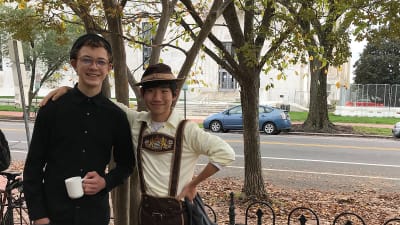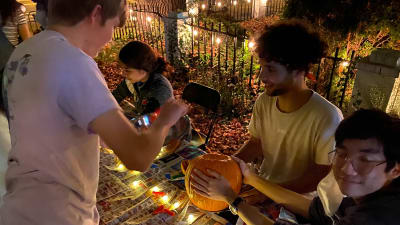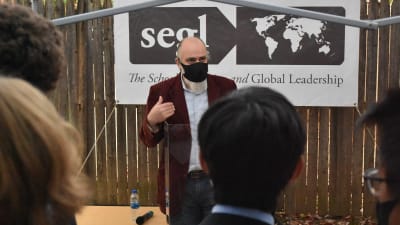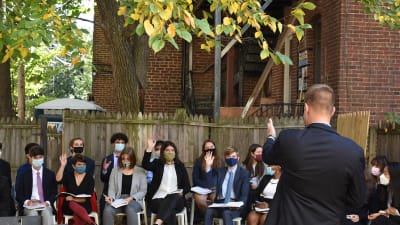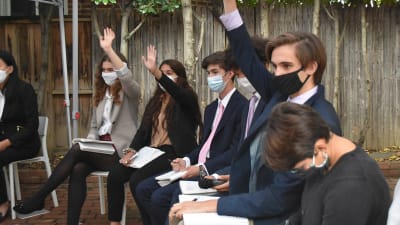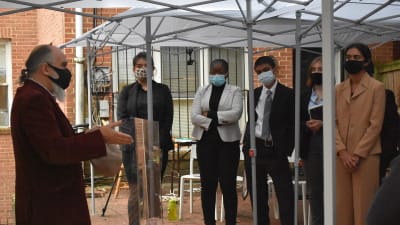Palestinians, Israelis, and Fall 2020
Just months ago, the Trump Administration brought the Israeli-Palestinian Conflict back into the American limelight by unveiling a controversial peace plan. The unveiling, and the many reactions to it, brought new urgency to one of SEGL’s classic case studies. That urgency only grew last week when Joe Biden, whose approach to the dispute will be different from Donald Trump’s, was elected President.
Can Palestinians and Israelis make peace, and if so, how? Is the conflict intractable? Or could new leaders (perhaps some of them SEGL graduates) find a new solution? These questions, and many others, made up our latest case study. Along the way, we met with three key leaders whose work continues to impact the conflict.
Our students began with SEGL’s account of Israeli-Palestinian history: the competing promises of T.E. Lawrence and the Balfour Declaration, the competing boundaries in 1948, 1967, and today, the competing visions for the future within Israel and within the Palestinian leadership. (Due to construction noise around the courtyard where Ethics and Leadership class usually meets, we gathered across the street in the world-famous Folger Shakespeare Theatre. Thanks to our friends there for allowing us to use this special space!). Our historical account makes every attempt to be unbiased, but we also tell the students that many observers on both sides would want to add, subtract, or edit each PowerPoint slide we shared. Critical thinking and questioning are a must in this area of study!
(Another SEGL truism: if, after a case study, you want to hear a view different from the ones presented, say something! If there is enough interest, we can often arrange for a supplementary speaker later in the semester; if there is not enough interest, any interested student can set up her or his own meetings during a free period.)
Our first guest was Ghaith al-Omari, a former top advisor to Palestinian leader Mahmoud Abbas and a negotiator in the 2000 Camp David peace talks (he is also the 2015 winner of the SEGL Golden Mug Award). Al-Omari, who now works with the American Task Force on Palestine and the Washington Institute for Near East Policy, shared stories and strategies from his time as a negotiator. For example: it is not enough to negotiate so that your side “wins.” You must also ensure that the speech your “opponent” gives to her people allows her to claim victory as well–otherwise, the deal will fall through. (To read a recent interview with al-Omari about President Trump’s plan, click here.)
The following week we welcomed Elad Strohmeyer, spokesperson for the Israeli Embassy in DC. Strohmeyer presented an energetic, Israeli-centric view of not only the conflict, but his government’s view of the Trump Administration, the recent choice to move the U.S. embassy to Jerusalem, and other current hot topics. He also shared his passion for LGBTQ rights in Israel. (Strohmeyer is quoted in recent articles here and here.)
Two weeks later we met with longtime SEGL guest speaker–and advisor to six Secretaries of State–Aaron David Miller. Miller, who now works at the Carnegie Endowment for International Peace helped provide context for the current status of the conflict and answered questions about his time as a lead negotiator for the U.S. at the 2000 Camp David II discussions (across the table from Mr. al-Omari) and other key negotiations. (To read Miller’s recent op-ed on the Trump peace plan, click here.)
As you might expect, the three viewpoints were quite different, though students also expressed surprise at several key shared beliefs. Learning how to hear the other side, how to ask tough-but-respectful questions, and how to discuss the most deeply-felt of issues are key leadership traits, and also essential parts of an SEGL education.
Below we’ve also included photos from our late-October pumpkin carving night, a few Halloween costumes, and a Saturday night scavenger hunt.




